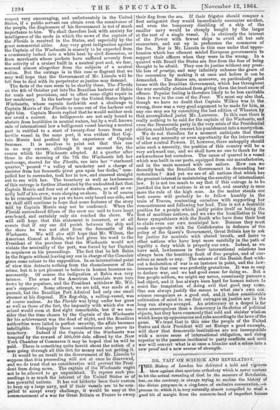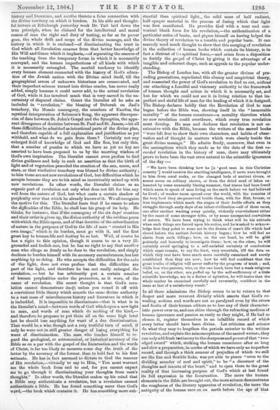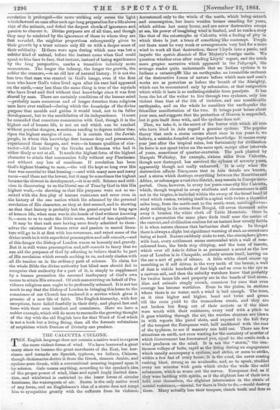DR. TAIT ON SCIENCE AND REVELATION.
THE Bishop of London has delivered a bold and vigorous blow against that spurious orthodoxy which is never content to let the actual revealing of God be the measure of Revelation, but, on the contrary, is always trying to enclose the history of the divine purposes in a ring-fence of exclusive consecration, —a process in which it is very naturally almost compelled to steal a good bit of margin from the common-land of imperfect human
history and literature, and ascribe thereto a false connection with the divine territory on which it borders. In his able and thought- ful lecture at Edinburgh yesterday week Dr. Tait laid down the true principle, when he claimed for the intellectual and moral reason of man the right and duty of testing, so far as its power goes, the whole drift and scope of the divine message, and the history in which it is enclosed—of discriminating the trust in God which all Revelation assumes from that better knowledge of His Will and Grace which it implants,--of separating the essence of the teaching from the temporary forms in which it is necessarily conveyed, and the human imperfections of all kinds with which it is necessarily entangled. The morbid tendency to identify every human element connected with the history of God's educa- tion of the Jewish nation with the Divine mind itself, till the geographical errors of unknown historians are consecrated, and their imperfect science turned into divine oracles, has never really added, simply because it could never add, to the actual revelation of God, while it has involved much that is very sacred in the un- certainty of disputed claims. Grant the literalist all he asks as included in " revelation," the blessing of Deborah on Jael's treachery, the Mosaic cosmogony, the numbers of Exodus, the mystical interpretation of Solomon's Song, the apparent discrepan- cies of date between St. John's Gospel and the Synoptics, the appa- rent divergence of doctrine between St. Paul and St. James,—let all these difficulties be admitted as intentional parts of the divine plan, and therefore capable of a full explanation and justification as yet withheld, and what do we gain from them ? Certainly not any enlarged field of knowledge of God and His Son, but only this, that a number of puzzles to which we have as yet no key are asserted to have been proposed to us by the unerring wisdom of God's own inspiration. The literalist cannot even profess to find divine guidance and help in such an assertion as that the birth of light and of vegetation preceded the creation of the sun, moon, and stars, or that vindictive treachery was blessed by divine authority ; to him these are not new revelations of God, but difficulties which he accepts because they are to his mind so inextricably mixed up with new revelations. In other words, the literalist claims as an organic part of revelation not only what does not lift for him any veil from the nature of God, but what casts a certain shadow of perplexity over that which he already knows of it. We all recognize the motive for this. The literalist fears that if he ceases to adore the difficulties of the Bible, he shall lose his grasp of its help. He thinks, for instance, that if the cosmogony of the six days' creation and their order is given up, the divine authority of the sublime poem withwhich the Bible opens, and of that doctrine of the subordination of nature in the purposes of God to the life of man " created in His own image," which is its burden, must go with it, and the first great key to human life and destiny be so lost. Well, of course lie has a right to this opinion, though it seems to us a very ill- grounded and foolish one, but he has no right to say that another man who clings as firmly as he does to the revelation, and simply declines to burden himself with its accessory encumbrances, has lost anything by so doing. He who accepts the difficulties for the sake of the light, does not even profess that the difficulties are part of the light, and therefore he has not really enlarged the
revelation, but he has arbitrarily put a certain number of human perplexities under the protection, as it were, of the name of revelation. His secret thought is that God's reve- lation cannot demonstrate itself, unless you round it off with a convenient little theory which accords the same divine authority to a vast mass of miscellaneous history and literature in which it is imbedded. It is impossible to discriminate—that is what is in the literalist's mind—between words of God which open a new light to man, and words of man which do nothing of the kind,— and therefore he proposes to put them all on the same high level lest he should lose anything for want of a due discrimination. That would be a wise though not a very truthful turn of mind, if only he were not in still greater danger of losing everything for want of discrimination. The man who teaches himself to re- gard the geological, or astronomical, or historical accuracy of the Bible as on a par with the gospel of the Incarnation and the words of Christ, is far too likely to measure some day the truth of the latter by the accuracy of the former. than to hold fast to his first estimate. He has in fact assumed to dictate to God the manner of His revelation,—virtually to say to Him, " You must warrant me the whole book from end to end, for you cannot expect me to go through it discriminating your thoughts from man's thoughts." In other words, the literalist makes up his mind that a Bible may authenticate a revelation, but a revelation cannot authenticate a Bible. He has found something surer than God's word,—the book which contains it. He has something more sub- stautial than spiritual light,, the solid mass of half radiant, half opaque material in the process of fusing which that light was first manifested. He provides God with a neat and con- venient blank form for his revelation,—the authentication of a particular series of books, and piques himself on having helped the divine theory of revelation to a tenable and popular basis. It can scarcely need much thought to show that this merging of revelation in the collection of human books which contain its history, is in fact a distrust of its spiritual force,---and arises from a disposition to fortify the gospel of Christ by giving it the advantage of a tangible and coherent shape, such as appeals to the popular under- standing.
The Bishop of London has, with all the greater divines of pre- ceding generations, repudiated this clumsy and unspiritdal theory, and reasserted the power of God's revelation to find us out, without our attaching a fanciful and visionary authority to the framework of human thought and action in which it is necessarily set, and but for which we could not see it in living relation to that im- perfect and sinful life of man for the healing of which it is designed. The Bishop declares boldly that the Revelation of God to man began before the Bible was, showing itself in the " immutable morality " of the human conscience—a morality therefore which no new revelation could overthrow, which every true revelation must develop. He sees and declares that revelation is not co. extensive with the Bible, because the writers of the sacred books "were left free to show their own characters, and habits of obser- vation and of thought in matters which were clearly beside the great divine message." Ile admits freely, moreover, that oven in the assumptions which they made as to the date of the first re- corded revelation in the history of man, there may ultimately prove to have been the vast error natural to the scientific ignorance of the day We have been thinking how he [a 'good man in this Christian country '] would receive the startling intelligence, if news wore brought to him from coral rocks, or the changed beds of ancient rivers, or secret caves on solitary shores, or from the dried mud of lakes ex- hausted by some unusually blazing summer, that traces had been found which seem to spoak of man living on the earth before we had believed he lived ; of weaker races spread over the world, with the remains of the very food they ate preserved beside them, with the flint, bronze, or iron implements which mark the stages of their feeble efforts as they struggle through early days of an infant civilization—all of these races, one after another wasting away quietly, violently overwhelmed either by the onset of some stronger tribe, or by some unexpected convulsion of nature. We have been trying to think what will be his attitude when such things are forced upon his notice, and he is asked to acknow- ledge that they point to some act in the drama of man's life which had closed before the earliest Jewish history began ; how ho will feel no alarm from such tidings ; how, on the one hand, ho will be glid patiently and honestly to investigate them; how, on the other, ho will certainly avoid springing to a self-satisfied certainty of conclusions which must remain, to say the least, very uncertain, till the data on which they rest have been much more carefully examined and surely established than they are now; how he will fool confident that the great truths of religion will never suffer by the progress of truth ; and, while loss wise persons, who, on the one hand, have but a weak religious belief, or, on the other, are puffed up by the self-sufficiency of a little scientific knowledge, are in a flutter of agitation, he will desire that the whole matter be examined carefully and reverently, confident in the issue at last of a satisfactory result."
In all these admissions the Bishop seems to us to return to that deeper and more reverent divinity which asserts that God's re- vealing actions and words are not so paralyzed even by the errors and faults of their human editors as to lose any of their character- istic power over us, and can shine through the refracting medium of human ignorance and passion as easily as they might, if He had so chosen it, register themselves in an infallible record of which every letter should have been divine. Let criticism and science do what they may to lengthen the periods anterior to the written revelation, and explain the misconceptions of the sacred writers, they can only add fresh testimony to the sharpness and power of that " two- edged sword" which, striking the human conscience after so long and slow a preparation, in modes of which we have only an imperfect record, and through a thick armour of prejudice of which we still see the fine and flexible links, was yet able to pierce "even to the dividing asunder of soul and spirit," to be " a discerner of the thoughts and intents of the heart," and to open them to the great reality of that increasing purpose of God's which at last found its full expression in the Incarnation. The more the human elements in the Bible are brought out, the more science demonstrates the roughness of the literary apparatus of revelation, the more the antiquity of the human race on ou earth before the age of that revelation is prolonged—the more •striking only seems the light whichdawned on man after such age-long preparation for a life above that of the animals, and defied the deepest clouds of ignorance and passion to obscure it. Divine purposes are of all time, and though they may be misdated by the ignorance of those to whom they are first revealed, the mightier proportions subsequently given to their growth by a truer science only fill us with a deeper sense of their sublimity. If,there were ages during which man was but a subtler kind of animal, before the instant came when God could speak to him face to face, that instant, instead of losing significance by the long perspective, marks a transition infinitely more momentous. The longer the infancy, the longer the growth, the nobler the creature,—is an old law of natural history. It is not the less true that man was created in God's image, even if the first man who knew God's voice lived ages after his race had appeared on the earth,—any less than the same thing is true of the myriads who have lived and died without that knowledge since it was first shared by man. There are certainly conditions of the human mind —probably more numerous and of longer duration than religious men have ever realized—during which the knowledge of the divine purpose that moulds and guides it would tend, not to its fuller development, but to the annihilation of its independence. It must be conceded that conscious communion with God, though it is the highest end of human life, is not an end which can be reached without peculiar dangers, sometimes tending to depress rather than ripen the highest energies of man. It is certain that the Jewish people, in whom this knowledge first became deep and permanent, experienced those dangers, and were—in human qualifies of cha- racter—left far behind by the 'Greeks and Romans who had it either dimly or not at all. It needs the highest form of the highest character to attain that communion fully without any Pharisaism and without any loss of manliness. If revelation. has been God's highest blessing to man,—the veil He kept so long over'His face was essential to that blessing :—and with many men and many races—and these not the lowest, but it may be sometimes the highest because the slowest in development, it is so-still. Science and criti- cism in discovering to us the liberal use of Time by God in this His highest work,—in showing us that His purposes were not so un- mixed with the free play of human resistance and error even in the history of the one nation which He educated by the personal revelation of His character, as they at first seemed, and in showing us that that history is probably but the grand sequel to long ages of human life, when man was in the hands of God without knowing it,—seem to us to make the Bible more, instead of less significant.
It may be that rash men having once freely admitted to them- selves the existence of human error and passion in sacred litera- ture will go to it at first with less reverence, and reject some of the divine truth in it with superficial presumption and self-conceit,—and of this danger the Bishop of London warns us honestly and gravely. But it is still worse presumption aukself -conceit to fancy that we can aid the purposes of God by affecting to believe that to be part of His revelation which reveals nothing to us, and only clashes with .all He teaches us in the ordinary path of science. To claim for the whole Bible the divine authority lest blind men should fail to recognize that authority for a part of it, is simply to supplement by a human precaution the assumed inadequacy of .God's own means to attain His own end. Of such manceuvring on behalf of Pro. vidence religious men ought to be profoundly ashamed. It is not too much to Bay that the Bishop of London in bringing this home to the conscience of our Church has rendered it a service which gives it promise of a new life of faith. The English hierarchy, with few exceptions, have failed fearfully in their duty, and played fast and loose with their own intellect and conscience. Here we have a nobler example, which will do more to reconcile the growing thought of the day with the old English love for that Word of God which is not a book but a living Being, than all the forensic refutations of scepticism which Doctors of Divinity can produce.
































 Previous page
Previous page